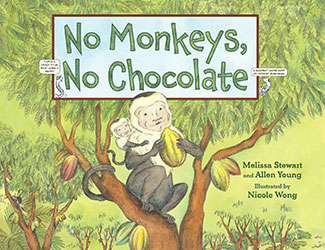Teachers often feel frustrated when the revisions students make to their writing aren’t improvements. And so they ask me how to help the children make their manuscripts better.
I wish I had an easy answer for these teachers and for their students, but here’s the truth: Revision is messy. It’s fraught with detours. Even experienced writers struggle with the process, and sometimes our efforts are complete and utter failures. That’s why writing is hard.
 As I describe in this Revision Timeline, creating the picture book No Monkeys, No Chocolate was a 10-year journey. When I share this timeline with students, they always ask the same question: “Does it always take so long to write a book?”
As I describe in this Revision Timeline, creating the picture book No Monkeys, No Chocolate was a 10-year journey. When I share this timeline with students, they always ask the same question: “Does it always take so long to write a book?”
No, it doesn’t. But for most of the picture books I’ve written, the journey from inspiration to publication is far longer than most people expect. Here are some stats:
- Can an Aardvark Bark? … 7 years
- Feathers: Not Just for Flying … 8 years
- Pipsqueaks, Slowpokes, and Stinkers: Celebrating Animal Underdogs (forthcoming) … 7 years
- A Place for Butterflies … 5 years
- Summertime Sleep (forthcoming) … 8 years
- Under the Snow 5 years
For each of these manuscripts, I wrote draft after draft after draft. And I openly admit that some of those drafts were worse than the ones that came before them.
When it comes to writing, not every attempt is an improvement. Not every idea pans out, but that’s okay because each failure teaches us something. It’s just part of the process. Like I said, writing is hard.
But writing is also important. For more and more people, being able to clearly express information and ideas on paper is a critical job skill. And that’s why I think the best thing a writing teacher can do is:
Be a Coach
 A good coach knows how to help players improve by giving them the right advice at the right moment. Writing teachers can do this by building a classroom collection of mentor texts and handing them titles that will address specific writing elements that they’re struggling with. For nonfiction, the collection should include books with:
A good coach knows how to help players improve by giving them the right advice at the right moment. Writing teachers can do this by building a classroom collection of mentor texts and handing them titles that will address specific writing elements that they’re struggling with. For nonfiction, the collection should include books with:
- various formats and text structures
- different writing styles (narrative and expository)
- different voices (lyrical, lively, and a range of options in between)
- strong verbs
- rich use of language devices (alliteration, onomatopoeia, similes and metaphors, etc.)
Coaches also teach strategies by going over past games play by play. Writing teachers can use old student work to showcase how those writers chose a clever format or used voice well or included strong verbs.
Be a Role Model
 When I do writing workshops in schools, students produce the best writing when their teacher participates. She pays attention to what I’m saying. She takes notes. She asks questions. And most importantly, she writes right alongside her students.
When I do writing workshops in schools, students produce the best writing when their teacher participates. She pays attention to what I’m saying. She takes notes. She asks questions. And most importantly, she writes right alongside her students.
As the teacher writes, she verbalizes the things that are challenging her. She asks her students for advice. She encourages them to consult with one another. She shows them that writing is a struggle for everyone and, yet, it’s something that is worthy of her time — and theirs.
Be a Cheerleader
 When students feel frustrated or defeated, writing teachers can spur kids on. They can encourage young writers to keep trying by sharing examples of their own setbacks and successes. They can also share the trials and tribulations that professional writers discuss on their blogs or social media. More and more children’s book creators are discussing their process and describing the challenges they encountered along the way.
When students feel frustrated or defeated, writing teachers can spur kids on. They can encourage young writers to keep trying by sharing examples of their own setbacks and successes. They can also share the trials and tribulations that professional writers discuss on their blogs or social media. More and more children’s book creators are discussing their process and describing the challenges they encountered along the way.
Following these three tips won’t provide a quick fix to students’ revision struggles, but it will give children hope and assure them they aren’t alone. Revision isn’t easy, but it’s well worth the effort.

Excellent tips, Melissa!
Thank you very much for this article. Now I active learn this theme because recently I began working with students. I really agree with you that writing teachers must motivate young writers.